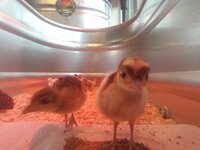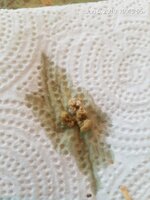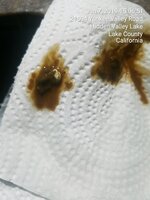Expladv
In the Brooder
Hello, I'm new to forum and new to peachicks. I've read lots of helpful posts on this site and am looking for advice on my new flock (9 days old). I have them raised with 11 guinea keets and 4 chicks although I separated the chicks yesterday into a separate brooder.
For background, I started with five peachicks, but one died on Wednesday afternoon. It got pasted up, failed to thrive, did not grow and appeared to be starving itself even though I know it had learned to eat and drink. I have been doing all the recommended steps of cider vinegar, greens clippings, electrolytes, etc. I spoon fed it some mash made with honey water and it seems to rally wednesday morning, but died that afternoon. I had moved them off the medicated food because I learned from this site that amprol can block thiamine.
The other chicks seem to be OK. I cleaned several keets that had pasty butt wednesday night and none have had it before or since. One of the peachicks (the pied one in pick). Had some pasty butt Thursday morning, I cleaned it and it's been mostly clear since. Since the remaining birds seem healthy and full of vigor, I moved them back to the medicated chick crumble because I can't figure out how to access other recommended medicines (metronidazole, baytril, safeguard, etc.) because no vets will talk to me unless they see the birds, but I'm afraid to unnecessarily transport them and stress them by being away from their brooder. Everyone seems to be generally OK, but I'm not sure if some of the runny poops are cause for concern. Can you with more experience let me know what you think of the photos? First one of the cute pied guy and his/her buddy and then next of its poop yesterday and it's poop today. Are they in the realm of normal or cause for concern?
Thank you!
Sarah
For background, I started with five peachicks, but one died on Wednesday afternoon. It got pasted up, failed to thrive, did not grow and appeared to be starving itself even though I know it had learned to eat and drink. I have been doing all the recommended steps of cider vinegar, greens clippings, electrolytes, etc. I spoon fed it some mash made with honey water and it seems to rally wednesday morning, but died that afternoon. I had moved them off the medicated food because I learned from this site that amprol can block thiamine.
The other chicks seem to be OK. I cleaned several keets that had pasty butt wednesday night and none have had it before or since. One of the peachicks (the pied one in pick). Had some pasty butt Thursday morning, I cleaned it and it's been mostly clear since. Since the remaining birds seem healthy and full of vigor, I moved them back to the medicated chick crumble because I can't figure out how to access other recommended medicines (metronidazole, baytril, safeguard, etc.) because no vets will talk to me unless they see the birds, but I'm afraid to unnecessarily transport them and stress them by being away from their brooder. Everyone seems to be generally OK, but I'm not sure if some of the runny poops are cause for concern. Can you with more experience let me know what you think of the photos? First one of the cute pied guy and his/her buddy and then next of its poop yesterday and it's poop today. Are they in the realm of normal or cause for concern?
Thank you!
Sarah






